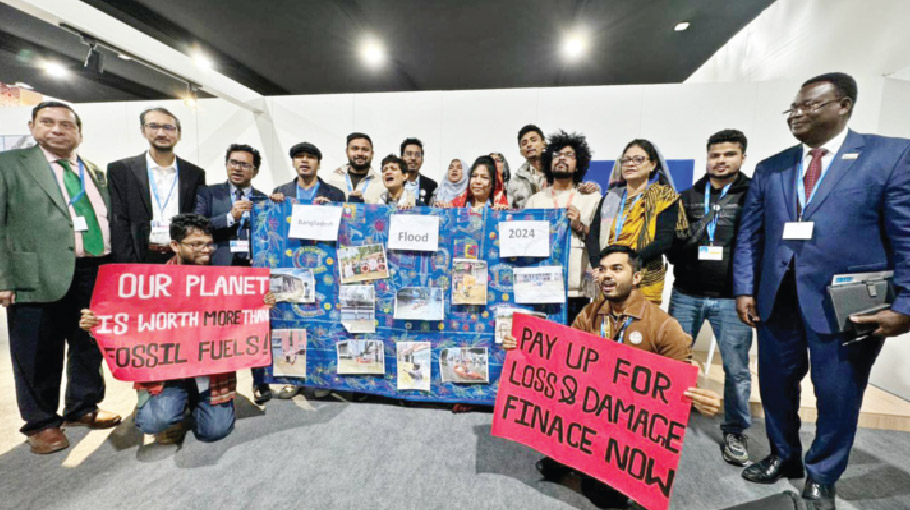Bangladeshi youths highlight climate crisis at COP29 thru Nakshi Kantha

Bangladeshi youths are showcasing Nakshi Kantha, the country’s rich national heritage, at an exhibition during the ongoing the UN climate conference COP29 in Baku of Azerbaijan.
They arranged the exhibition on Nakshi Kantha to show how the marginalised communities of the country involved in the traditional embroidery made on old saris have been hit by climate change.
Young climate activists from Bangladesh, one of world’s most climate-vulnerable countries, participated in the COP29. They are highlighting the climate challenges their country facing and the actions needed to address them.
Nakshi Kantha symbolises the lifestyle of people of Bangladesh. Though this media of folk art, women express their feelings about the struggle for their livelihood.
A group of Bangladeshi youths have brought their country’s climate crisis to the global stage at the COP29 through showcasing Nakshi Kantha organised by YouthNet Global.
Sohanur Rahman, a young climate activist of Bangladesh who is now staying in Baku of Azerbaijan for COP29, said this while talking to the Bangladesh Post on Saturday.
Farhina Ahmed, Secretary of the Ministry of Environment, Forest and Climate Change spoke at the inaugural ceremony of the Nakshi Kantha exhibition.
In her speech, Farhina laid emphasis on the critical need for international support to address climate issue. “Bangladesh needs around $876 billion to fight the climate crisis,” she added.
“As damages continue to rise, international funding is essential for transitioning to a sustainable, low-carbon economy. The Nakshi Kantha exhibition will help COP29 participants understand our reality and the challenges faced by Bangladesh’s vulnerable populations,” she added.
Farhina called upon the youths to play more active role in advocating for climate justice, saying, “The youth must lead the call for demanding urgent action to protect our future.”
Government officials, private sector representatives, local and international civil society members, and young climate activists took part in the inauguration of the exhibition.
Speakers at the inaugural ceremony underscored the urgent need for substantial financial support to help Bangladesh adapt to climate change and strengthen its resilience.
“We need global cooperation to address the challenges faced by climate-impacted countries like Bangladesh,” Farhina said.
Bangladesh faced severe climate impacts in 2024, including severe winter, prolonged drought, devastating fires, and unexpected floods.
Different districts like Feni, Comilla and the Chittagong Hill Tracts region have been hit by flooding, while coastal areas such as Satkhira and Barguna are battling freshwater shortages and erosion exacerbated by cyclones.
Sohanur Rahman, executive coordinator of YouthNet Global, pointed out the cultural losses caused by the climate crisis. “COP29 may be called 'The Finance COP,’ but we cannot overlook the non-economic losses, particularly in terms of preserving our cultural heritage,” he said.
He also called for devising climate policy that respects indigenous knowledge and traditions, saying, “Climate policy must reflect the diversity of values and relationships with nature. Indigenous knowledge should be a central part of creating sustainable, equitable solutions.”
“The Nakshi Kantha exhibition at COP29 serves not only as a reminder of Bangladesh’s climate struggles but also as a strong call for greater global support and action to address both economic and cultural impacts of climate change,” Sohanur Rahman said.




